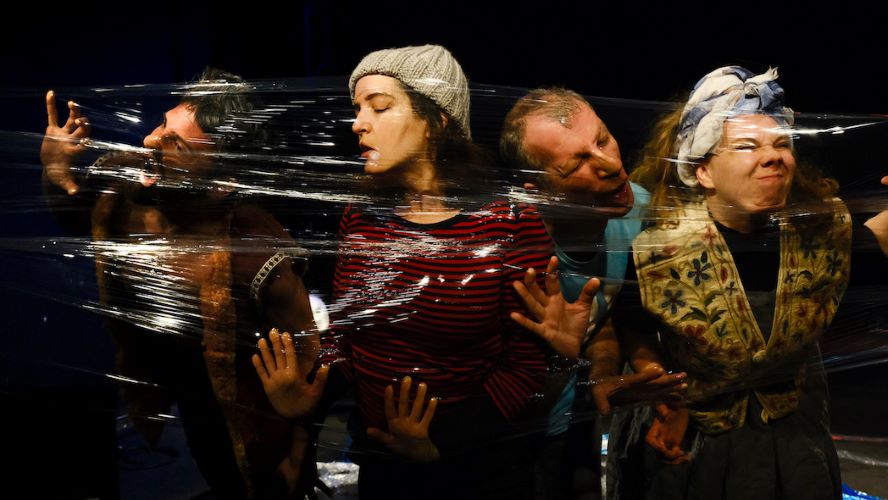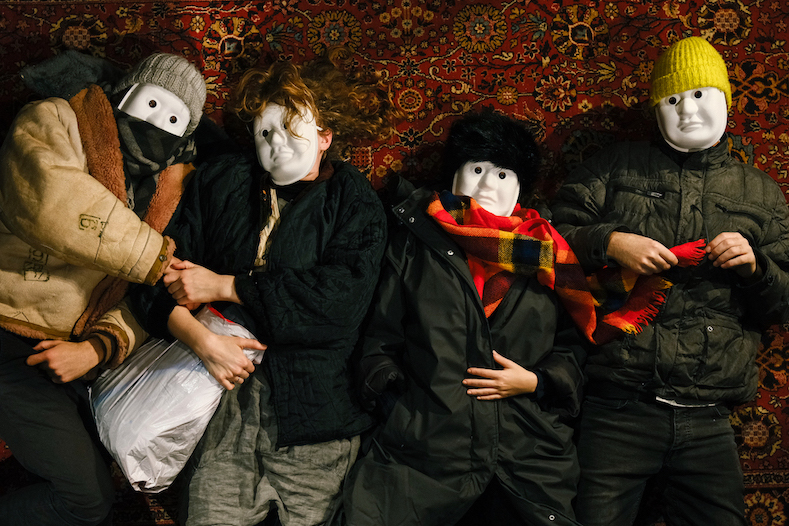
Four actors walk, murmur, and stretch. Every now and then they gaze at monitors where someone is being interviewed, but the volume is shut down, their speech is silent. Perhaps it’s a metaphor. The stage of the Malenky Theatre emanates a sense of anticipation as the audience members take their seats, waiting for something to begin. The Story and a Half is a work of documentary theatre, based on the diaries, memories and interviews with Generation 1.5, those people who immigrated to Israel as children or teenagers in the 1990s. Culled from their stories, the play shares the experiences of these diverse individuals, each with their own journey.
The stories are told in the first person, with the actor speaking directly to the audience. The atmosphere is intimate, it is as much a conversation as it is a performance; a conversation in which it is our role as an audience, as a community, to listen. There is a raw energy to the performance, vivid and visceral, that imparts an urgency to the telling. We come to know and care about these characters.
The set is intentionally simple and stark, costumes and props utilized with precision; just enough to suggest a character, evoke a setting. Leon Nonin puts on a striped shirt, and smiling, becomes Lev, just 8 or 9 years old – old enough to notice that in school he and Masha, the only other Jewish child in the class, are seated together; too young to understand why Masha’s family is leaving Russia. A child’s experience of immigration is dramatically different from that of an adult – depending on their age at the time, they may not fully comprehend the reasons for the move, or its permanence. Most significantly, the decision to immigrate is made by the adults in the family, what is seen by the adults as a move towards a better future, may be felt by the children as being uprooted from the only home they have ever known.
As the actors take on different characters, telling these personal stories, the impact is twofold: the experience and feelings of the child or teenager that they were, and the reflections, thirty years later, of the person they have become. The actors embody the characters fully, taking on different roles throughout the play, they draw us in with the power of their presence. Xsenia Markuze is larger than life as Ksu, who loves music and is looking for adventure, her curls wild and her gestures large and free, her perspective vivid – describing a school official in Israel as “Stalin in a skirt.” Later, she will portray Julie, sitting elegant and still in her black-framed stylish glasses and blazer, who tells of a different kind of struggle, the fight to make it in a place where you know you are not wanted. David Zisselson imparts all the excitement and energy of five-year-old Lyosha who thinks he is going to Africa, as well as the embarrassment of an older youth who is aware of the differences between his family and the surrounding “Israelis”, as well as the mature hindsight of the man who looks back on it all. Some of the changes are for the better. Hadas Eyal takes on the role of Luba: left-handed, in school in Russia she is forced to conform and learn to use only her right hand, after immigrating to Israel, she is free to use her left hand again.
Other aspects of life in Israel are not quite as benign. Putting on a blue baseball cap, Leon Nonin becomes Evgeniy, shuttled from one country to another after the death of his mother, and ending up in a boarding school, where gangs of kids ruled the place like a “Russian jail”. Whether a victim or a perpetrator, there is damage, and the adult Evgeniy looks back in anguish, asking – where were the teachers, didn’t they see? In one of the most challenging and moving scenes, Eyal is riveting and entirely transformed as Irina, who tells a story of cruel discrimination, the life of an outsider to conventional society, and the price exacted by those choices. “I didn’t have any idols,” she recounts, there were no role models for Irina, no adults she could look up to and emulate – neither within her family nor in her surrounding environment. There is a cost to being an outsider, and there is a cost to fitting in; so many of these stories are stories of loss.

The physicality of the performance communicates all that words cannot tell, in moments that are funny, ecstatic, or melancholy. One of the funniest moments in the play is when all four actors stumble in, looking stunned and perhaps a bit scared, wrapped in layers of clothing, coats and fur hats, recreating the shock of landing in Israel. Plastic wrap takes on significance in the play, a symbol of the new-found material abundance, as well as the freedom of Israeli culture. Music blaring, the stage lit up in blue and red, all four dance – wild and uninhibited. The men take off their shirts, and Eyal dances with scraps of plastic wrap that she lifts like huge, crazy wings. Yet two wide strips of plastic wrap are stretched from one side of the stage to the other, like a transparent wall. All four move forward, pushing up against it, their features distorted in the effort. It’s a strong image, powerfully thought-provoking.
As the different characters tell their stories – funny, poignant, thoughtful, and sometimes harrowing – The Story and a Half delivers a moving experience for the viewer. An encounter with personal narratives of the immigration from Russia, the ones who came here in their youth, entertaining and full of insight, it is a glimpse into the inner world of people who we meet every day – at school, at work, and in the neighborhood, a small intimation of their thoughts, feelings, dreams, and struggles. Some of us will recognize ourselves in these stories. I felt moved and honored by the courage, honesty and generosity of the people who shared their stories and lives, as well as the talents of the creative team.
A Story and a Half
Directing and Dramaturgy: Michael Teplitsky; Project Coordinator and Assistant Director: Julia Goland; Lighting design: Misha Chernyavsky, Inna Malkin; Technical director: Sasha Lee; Cast: (in alphabetical order) Hadas Eyal, Xsenia Markuze, Leon Nonin, David Zisselson
According to the story of: (in alphabetical order) Ksu Borisov, Julie Kayt, Lev Kogan, Luba Laor, Daniel Margolin, Evgeniy Moliboga, Leon Nonin, Helen Roth, Irina Torch





